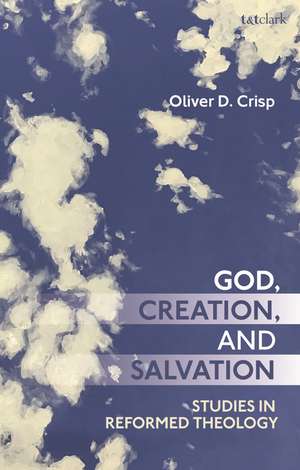God, Creation, and Salvation: Studies in Reformed Theology
Autor Dr Oliver D. Crispen Limba Engleză Paperback – 8 ian 2020
| Toate formatele și edițiile | Preț | Express |
|---|---|---|
| Paperback (1) | 196.44 lei 3-5 săpt. | |
| Bloomsbury Publishing – 8 ian 2020 | 196.44 lei 3-5 săpt. | |
| Hardback (1) | 567.09 lei 6-8 săpt. | |
| Bloomsbury Publishing – 8 ian 2020 | 567.09 lei 6-8 săpt. |
Preț: 196.44 lei
Preț vechi: 243.02 lei
-19% Nou
Puncte Express: 295
Preț estimativ în valută:
37.59€ • 40.82$ • 31.58£
37.59€ • 40.82$ • 31.58£
Carte disponibilă
Livrare economică 01-15 aprilie
Preluare comenzi: 021 569.72.76
Specificații
ISBN-13: 9780567689535
ISBN-10: 0567689530
Pagini: 224
Dimensiuni: 138 x 216 x 24 mm
Greutate: 0.27 kg
Editura: Bloomsbury Publishing
Colecția T&T Clark
Locul publicării:London, United Kingdom
ISBN-10: 0567689530
Pagini: 224
Dimensiuni: 138 x 216 x 24 mm
Greutate: 0.27 kg
Editura: Bloomsbury Publishing
Colecția T&T Clark
Locul publicării:London, United Kingdom
Caracteristici
Provides a series of theological "soundings" concerning live issues in contemporary systematic and philosophical theology
Notă biografică
Oliver D. Crisp is Professor of Systematic Theology at Fuller Theological Seminary, USA.
Cuprins
AcknowledgementsPreface I. The Task of Theology1. Challenges for Systematic Theology2. Receiving CalvinII. God and Creation3. Edwards on Creation and Divine Ideas4. Girardeau on Human Free Will5. Zwingli on Original Sin III. Christ and Salvation6. Assuming Human Flesh7. The Vicarious Humanity of Christ 8. Edwards's atonement quandary9. Character and True VirtueBibliographyIndex
Recenzii
There are many things to appreciate in this volume. First, it is a well-written academic word. Second, Crisp elucidates the depth and breadth of Reformed thinking. Thrid, he provides primary sources in footnotes when dealing with theologians of the past (Calvin, Zwingli, Edwards, and others). Fourth, the trajectory of his thought is mapped out in the preface, which serves as a foretaste of what he has baked in his theological oven. He also clarifies that some chapters were presented in different settings. That does not make the various topics disconnected though since Crisp weaves them together in a traditional dogmatics structure.
God, Creation, and Salvation offers readers a master class in theological thinking. With exemplary rigor and clarity, Oliver Crisp analyzes the central doctrines of the Christian faith, in creative dialogue with major theologians of the past, and in doing so he makes a bold case for theological inquiry today.
Oliver Crisp draws treasures old and new from the storehouse of Reformed theology with skill and precision, extending our understanding of the breadth of this rich theological tradition while at the same time affirming its most fundamental charisms. Crisp offers both affirmation to Reformed theologians and surprising points of ecumenical contact.
These essays continue Oliver Crisp's singular project of probing the notion of what counts as Reformed theology by expanding the cast of usual suspects, while simultaneously advancing the cause of analytic theology in a series of clarifying and constructive dialogues with these Reformed resources over a range of core Christian doctrines.
With clarity, precision, and grace, Oliver Crisp offers a series of essays that explore the breadth and diversity of Reformed thought across a range of issues, demonstrating that Reformed theology has the resources to think creatively about some of modern theology's most difficult problems.
Oliver Crisp's retrieval approach to Reformed Theology bears fruit as he engages broadly, constructively, and faithfully with an array of Reformed theologians, while also attending to the ways in which Reformed thought intersects with the great tradition of Christian thought. This book is not to be missed for those interested in accessing past theological wisdom for the present.
A leading exponent of analytic theology, Oliver Crisp displays his characteristic clarity and insight in a succession of essays on central doctrinal themes. Allied to his historical learning, his approach generates material that will repay study and stimulate further reflection, particularly within the Reformed tradition.
God, Creation, and Salvation offers readers a master class in theological thinking. With exemplary rigor and clarity, Oliver Crisp analyzes the central doctrines of the Christian faith, in creative dialogue with major theologians of the past, and in doing so he makes a bold case for theological inquiry today.
Oliver Crisp draws treasures old and new from the storehouse of Reformed theology with skill and precision, extending our understanding of the breadth of this rich theological tradition while at the same time affirming its most fundamental charisms. Crisp offers both affirmation to Reformed theologians and surprising points of ecumenical contact.
These essays continue Oliver Crisp's singular project of probing the notion of what counts as Reformed theology by expanding the cast of usual suspects, while simultaneously advancing the cause of analytic theology in a series of clarifying and constructive dialogues with these Reformed resources over a range of core Christian doctrines.
With clarity, precision, and grace, Oliver Crisp offers a series of essays that explore the breadth and diversity of Reformed thought across a range of issues, demonstrating that Reformed theology has the resources to think creatively about some of modern theology's most difficult problems.
Oliver Crisp's retrieval approach to Reformed Theology bears fruit as he engages broadly, constructively, and faithfully with an array of Reformed theologians, while also attending to the ways in which Reformed thought intersects with the great tradition of Christian thought. This book is not to be missed for those interested in accessing past theological wisdom for the present.
A leading exponent of analytic theology, Oliver Crisp displays his characteristic clarity and insight in a succession of essays on central doctrinal themes. Allied to his historical learning, his approach generates material that will repay study and stimulate further reflection, particularly within the Reformed tradition.
